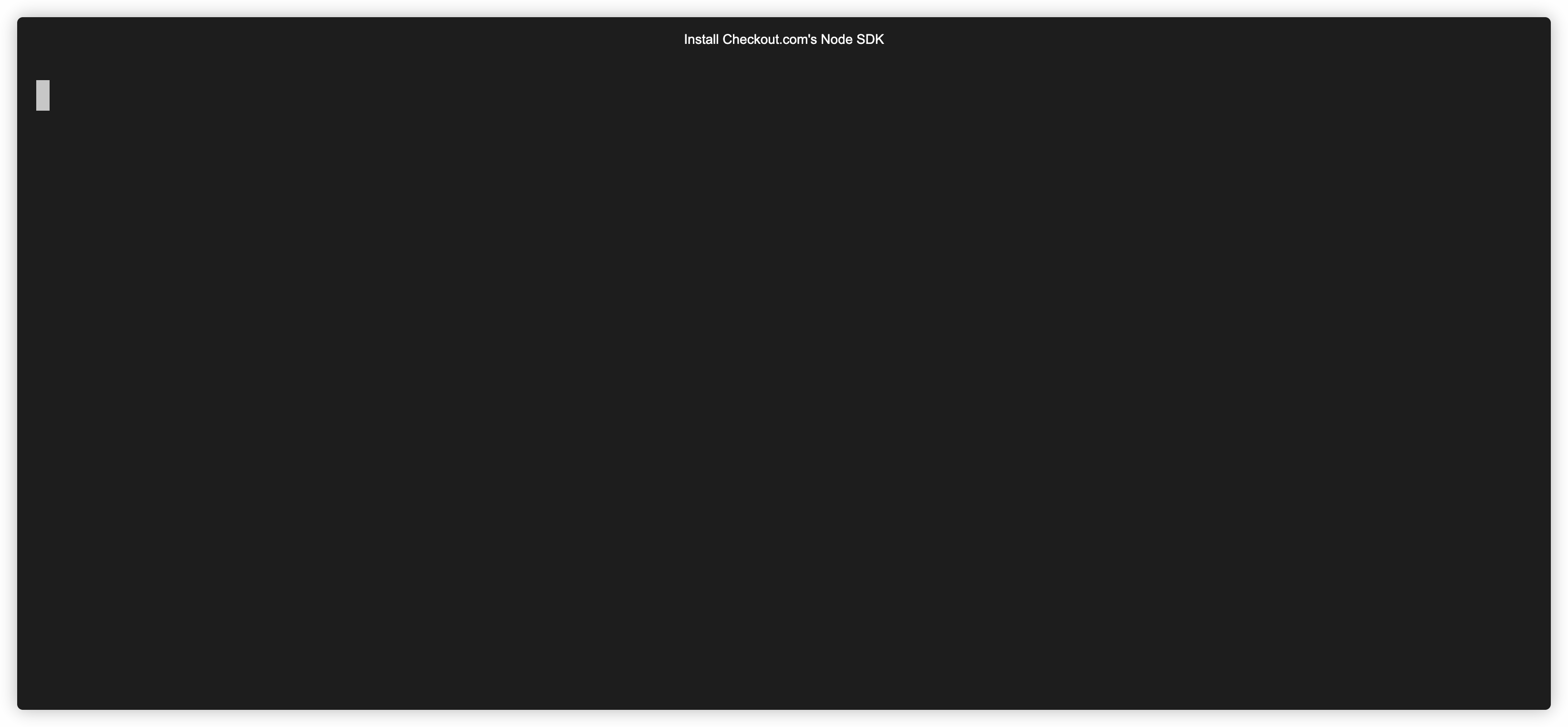https://github.com/checkout/checkout-sdk-node
Checkout.com SDK for Node.js. Documentation here:
https://github.com/checkout/checkout-sdk-node
accept-card-payments api-client card-processing credit-card node-js-payments online-payments payment-gateway payment-processing payments payouts sdk sdk-nodejs
Last synced: 11 months ago
JSON representation
Checkout.com SDK for Node.js. Documentation here:
- Host: GitHub
- URL: https://github.com/checkout/checkout-sdk-node
- Owner: checkout
- License: mit
- Created: 2020-02-24T15:46:56.000Z (about 6 years ago)
- Default Branch: master
- Last Pushed: 2024-04-19T10:55:04.000Z (almost 2 years ago)
- Last Synced: 2024-04-19T11:53:23.652Z (almost 2 years ago)
- Topics: accept-card-payments, api-client, card-processing, credit-card, node-js-payments, online-payments, payment-gateway, payment-processing, payments, payouts, sdk, sdk-nodejs
- Language: JavaScript
- Homepage: https://api-reference.checkout.com
- Size: 2.14 MB
- Stars: 58
- Watchers: 12
- Forks: 22
- Open Issues: 6
-
Metadata Files:
- Readme: README.md
- License: LICENSE
Awesome Lists containing this project
README
[](https://github.com/checkout/checkout-sdk-node/actions/workflows/build-master.yml)


[](https://codecov.io/gh/checkout/checkout-sdk-node)
[](https://github.com/checkout/checkout-sdk-net/actions/workflows/build-release.yml)
[](https://GitHub.com/checkout/checkout-sdk-node/releases/)
[](https://badgen.net/bundlephobia/minzip/action-test)


# :rocket: Install
```bash
npm install checkout-sdk-node
```
# :computer: Import
```js
// ES6:
import { Checkout } from 'checkout-sdk-node';
// Common JS:
const { Checkout } = require('checkout-sdk-node');
```
> If you don't have your API keys, you can sign up for a test account [here](https://www.checkout.com/get-test-account).
# :clapper: Initialize SDK
## With api keys or access credentials
Based on how your account was set up, you will either have a pair or API key or a set of access credentials. Here is how you can use the SDK in both scenarios:
```js
// API Keys
const cko = new Checkout('sk_XXXXXXXXX', {
pk: 'pk_XXXXXXX'
});
// Access credentials
const cko = new Checkout('your api secret here', {
client: 'ack_XXXXXXXX',
scope: ['gateway'], // or whatever scope required
environment: 'sandbox', // or 'production'
});
```
## With environment variables
If your account uses API Keys (pk_XXX + sk_XXX), you can set the following environment variables, and the SK will pick them up:
- *CKO_SECRET_KEY* (with a value like sk_XXX)
- *CKO_PUBLIC_KEY* (with a value like pk_XXX)
If you use access credentials (ack_XXXX), you can set the following environment variables, and the SK will pick them up:
- *CKO_SECRET*
- *CKO_CLIENT* (with a value like ack_XXXX)
- *CKO_SCOPE* (with a value of the scope or semicolon separated scopes in case you use multiple)
- *CKO_ENVIRONMENT* (with a value like sandbox or production)
## Set custom config
Basides the authentication, you also have the option to configure some extra elements about the SDK
```js
const cko = new Checkout('...', {
..., //other authentication config
host: "https://myProxyExample.com", // in case you need to use a custom host for tests
timeout: 60000, // HTTP request timout in ms
agent: new http.Agent({ keepAlive: true }), // custom HTTP agent
httpClient: 'axios' // specify axios httpClient, by default fetch. Optional
});
```
# :wrench: SDK Environment (Sandbox/Production)
When using API Keys (pk_XXX + sk_XXX) the SDK will automatically figure out what environment you are using however, if you use access credentials (ack_XXXX), make sure you set the "environment" in the config, as shown above in the initialization.
# :interrobang: Error handling
The SDK is using promises, and you can handle errors similar to any other HTTP call.
```js
try {
// some async request made with the SDK
const action = await cko.payments.request({...});
...
} catch (error) {
console.log(error.name, error.http_code, error.body)
switch (error.name) {
...
}
}
```
Here you have all the possible SDK specific errors:
| error.name | error.http_code | error.body |
| -------------------- | --------------- | ----------------------- |
| AuthenticationError | 401 | undefined |
| ActionNotAllowed | 403 | undefined |
| UrlAlreadyRegistered | 409 | undefined |
| NotFoundError | 404 | undefined |
| BadGateway | 502 | undefined |
| ValidationError | 422 | object |
| TooManyRequestsError | 429 | object/undefined |
| ValueError | 429 | string describing error |
# :book: Examples of usage
You can see examples of how to use the SDK for every endpoint documented in our [API Reference](https://api-reference.checkout.com/). All you have to do is to navigate to the endpoint you want to use, and select "Node" for the example on the right side.
> NOTE: If you use access credentials (ack_XXXX) the link to the API reference relevant to you will be shared by your Solutions Engineers.
# :eyeglasses: Try it on RunKit
You can try the SDK [here](https://npm.runkit.com/checkout-sdk-node).